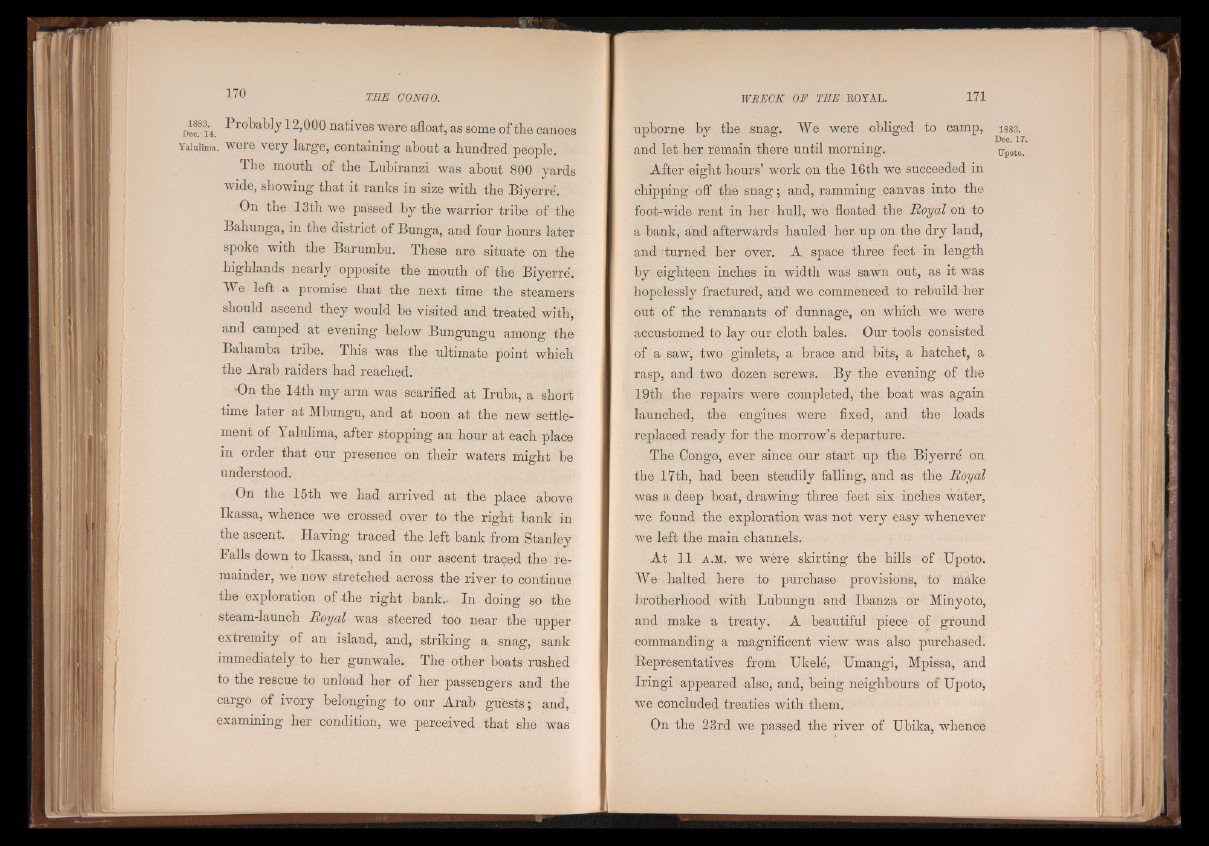
Probably 12,000 natives were afloat, as some of the canoes
were very large, containing about a hundred people.
The mouth of the Lubiranzi was about 800 yards
wide, showing that it ranks in size with the Biyerre.
On the 13th we passed by the warrior tribe of the
Bahunga, in the district of Bunga, and four hours later
spoke with the Barumbu. These are situate on the
highlands nearly opposite the mouth of the Biyerre.
"We left a promise that the next time the steamers
should ascend they would be visited and treated with,
and camped at evening below Bungungu among the
Bahamba tribe. This was the ultimate point which
the Arab raiders had reached.
On the 14th my arm was scarified at Iruba, a short
time later at Mbungu, and at noon at the new settlement
of Yalulima, after stopping an hour at each place
in order that our presence on their waters might be
understood.
On the 15th we had arrived at the place above
Ikassa, whence we crossed over to the right bank in
the ascent. Having traced the left bank from Stanley
Falls down to Ikassa, and in our ascent traced the remainder,
we now stretched across the river to continue
the exploration of the right bank.. In doing so the
steam-launch Royal was steered too near the upper
extremity of an island, and, striking a. snag, sank
immediately to her gunwale. The other boats rushed
to the rescue to unload her of her passengers and the
cargo of ivory belonging to our Arab guests; and,
examining her condition, we perceived that she was
upborne by the snag. We were obliged to camp,
and let her remain there until morning.
After eight hours’ work on the 16 th we succeeded in
chipping off the snag; and, ramming canvas into the
foot-wide rent in her i hull, we floated the Royal on to
a bank, and afterwards hauled her-up on the dry land,
and turned her over. A. space three feet in length
by eighteen inches in width was sawn out, as it was
hopelessly fractured, and we commenced to rebuild her
out of the remnants of dunnage, on which we were
accustomed to lay our cloth bales. Our tools consisted
of a saw, two gimlets, a brace and bits, a hatchet, a
rasp, and two dozen screws. By the evening of the
19th the repairs were completed, the boat was again
launched, the engines were fixed, and the loads
replaced ready for the morrow’s departure.
The Congo, ever since our start up the Biyerre on
the 17th, had been steadily falling, and as the Royal
was a deep boat, drawing three feet six inches wa,ter,
we found the exploration was not very easy whenever
we left the main channels.
At 11 a .m . we were skirting the hills of Upoto.
We halted here to purchase provisions, to make
brotherhood with Lubungu and Ibanza or Minyoto,
and make a treaty. A beautiful piece of ground
commanding a magnificent view was also purchased.
Representatives from TJkele, Umangi, Mpissa, and
Iringi appeared also, and, being neighbours of Upoto,
we concluded treaties with them.
On the 23rd we passed the river of Ubika, whence
■ .
Upoto.